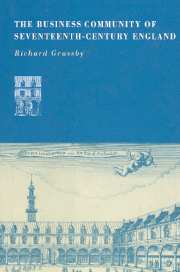Book contents
- Frontmatter
- Contents
- List of figures
- List of tables
- Preface
- List of abbreviations
- Explanatory notes
- Introduction: Questions and sources
- Part 1 Business as a career
- Part 2 Paths to fortune
- 5 The pattern of recruitment
- 6 Skills and motivation
- 7 Politics and government
- 8 The measure of success
- Part 3 Life styles
- Conclusion: Private enterprise in a pre-industrial economy
- Bibliography
- Index
8 - The measure of success
Published online by Cambridge University Press: 02 December 2009
- Frontmatter
- Contents
- List of figures
- List of tables
- Preface
- List of abbreviations
- Explanatory notes
- Introduction: Questions and sources
- Part 1 Business as a career
- Part 2 Paths to fortune
- 5 The pattern of recruitment
- 6 Skills and motivation
- 7 Politics and government
- 8 The measure of success
- Part 3 Life styles
- Conclusion: Private enterprise in a pre-industrial economy
- Bibliography
- Index
Summary
The dream of rags to riches was perpetuated by periodic reprints of legendary histories of businessmen. It was widely assumed in pamphlet wars and family correspondence, as it was in the Commons of 1621, that ‘the raysing of many good families from small beginnings and the recovery of many decayed houses of the Gentry’ could be ascribed to trade. Lewis Roberts argued, in 1641, that gentlemen ‘should by all likelihoods benefit themselves more in one yeare by a well governed traffick at sea, then peradventure at Court by ten years waiting and solicitations’. After 1660, several observers regarded business in general and London in particular as a primary source of capital accumulation for new men.
To Bacon an estate was a pond and trade a spring, but he added that there were many ways to riches and all of them were foul; it was through patents of monopoly, wardship, usury, legal trickery and marriage that men like Audley acquired wealth. Was business in fact an effective channel of upward mobility? To answer this question, it is necessary to establish the origins, scale and distribution of wealth (both capital and income) within the business community. Only then can the success of children from within and outside the business world be compared and the social impact of commercial wealth be assessed.
The rate of return
All businessmen acted as agents and earned commission without pledging their own capital. The normal rate in the Spanish, East Indian, Baltic, Teneriffe, Portuguese and Leghorn trades was 2–2.5 per cent; in the Netherlands in the 1620s it was 2 per cent, falling later as low as 1.5 per cent.
- Type
- Chapter
- Information
- The Business Community of Seventeenth-Century England , pp. 234 - 268Publisher: Cambridge University PressPrint publication year: 1995



